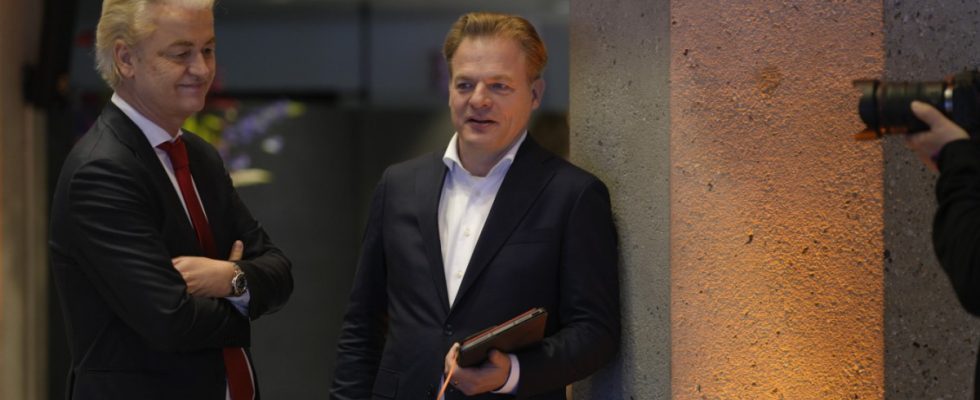Almost four months after the parliamentary elections, it is now possible to roughly predict how the Netherlands will be governed in the future. Accordingly, the expected cooperation between some right-wing and center-right parties will probably occur. However, not in the form of a “normal” government that relies on the majority of its own representatives in parliament and draws up a detailed coalition agreement. Rather, the parties apparently want to agree on a democratic experiment, the formation of a so-called extra- or extra-parliamentary cabinet. Its contours are still very blurry. But one thing is certain: the right-wing politician Geert Wilders will not lead the government. The clear winner in the November election announced on Wednesday evening via the short message service X that he was no longer seeking the office of Prime Minister. Wilders wrote that he could only have become prime minister if all parties in a coalition supported this. This was not the case.
The explorer Kim Putters announced on Tuesday evening that the “next step” could now be taken. He had previously spoken for two days at a country estate near Hilversum with Wilders from the Islam-critical, right-wing nationalist PVV as well as with Caroline van der Plas (Farmer Citizens Movement), Dilan Yeşilgöz from the right-wing liberal VVD and the centrist Pieter Omtzigt (New Social Contract, NSC). . They did not comment afterwards or commented vaguely. Putters also referred to the report that he will present this Thursday. In the media, his statement was nevertheless seen as a “breakthrough” after weeks of negotiations had made little progress.
What “extra-parliamentary” even means is controversial
Putters, a Social Democrat, had been explicitly commissioned by Parliament to find the “form” that a future government could take. The reason was that both Omtzigt and Yeşilgöz had refused to support a majority cabinet led by Wilders. Both had initially considered tolerating a minority cabinet, but then made it clear that they favored an extra-parliamentary form.
Their motives differ: Yeşilgöz cites the fact that the VVD, which has been in power since 2010, was clearly voted out of office in November. Omtzigt cites serious substantive differences with Wilders, especially regarding his stance on the rule of law. At the same time, long before the election, he had called for an extra-parliamentary cabinet for fundamental reasons. In his opinion, the usual majority governments, including hundreds of pages of agreements, have made the executive overpowering and parliament a mere cop-out.
There is strong debate in the media and among experts about what “extra-parliamentary” actually means. There is often talk of merely “loose agreements”, a “looser bond” between parliament and the cabinet than usual; some of the ministers come from outside parliament. The heads of the parties involved would not join the government, but would remain members of parliament – this is exactly what the current negotiators, including Wilders, are now said to have agreed to.
According to general opinion, little can be derived from historical examples, such as various cabinets from the interwar period. At most, the cabinet of the Social Democrat Joop den Uyl (1973 to 1977) could serve as a model; Its left-wing alliance also brought ministers from other parties into the government, and this without a formal agreement between the factions. However, unlike today’s protagonists, the Uyl did not have a majority in parliament. The result was changing voting majorities, as would now be expected: sometimes the parties that provide ministers come together, sometimes other constellations arise for programmatic reasons.
How should such a cabinet govern?
Observers ask how such a cabinet could govern with any stability and energy given the social polarization and the crisis-ridden foreign policy situation. As an example, they mention the “nitrogen crisis”, i.e. the fact that the Netherlands chronically violates EU nature conservation rules due to excessive livestock farming. There is no way around a solution to the problem that has been repeatedly suppressed by the incumbent cabinet, otherwise those in power will find themselves in a serious conflict with their own judiciary. Wilders, on the other hand, denies that the problem even exists. Deep differences are also to be expected in EU policy and especially in military aid for Ukraine. The question of which prime minister an extreme politician like Wilders could come to terms with will be just as exciting.
After Putters’ report, Parliament will decide on the next step next week. In the following round of negotiations, possibly under a new moderator, the first substantive points will come to the table.

